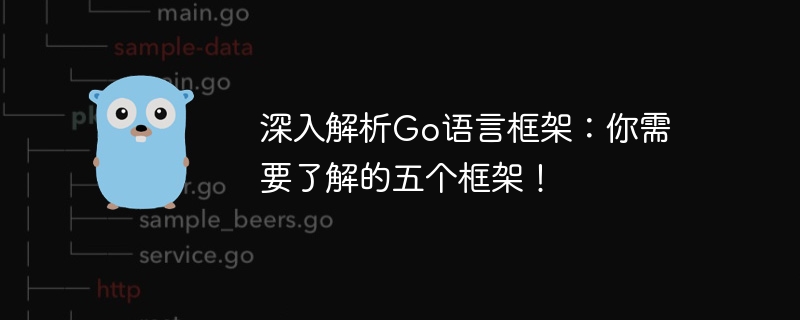Home >Backend Development >Golang >Explore the Go language framework: Learn about five essential frameworks!
Explore the Go language framework: Learn about five essential frameworks!
- WBOYWBOYWBOYWBOYWBOYWBOYWBOYWBOYWBOYWBOYWBOYWBOYWBOriginal
- 2024-02-26 09:15:06891browse

In-depth analysis of the Go language framework: Five frameworks you need to know!
With the continuous development and popularity of Go language, more and more developers are beginning to choose Go language as their development language. In order to develop and deploy applications more efficiently, developers often choose to use frameworks. In the field of Go language, there are many excellent frameworks to choose from, each with its own unique characteristics and applicable scenarios. This article will provide an in-depth analysis of five Go language frameworks to help you choose the appropriate framework to improve development efficiency.
1. Gin
Gin is a high-performance HTTP web framework inspired by Martini. It is fast, flexible and simple, suitable for building RESTful APIs. The following is a simple example:
package main
import "github.com/gin-gonic/gin"
func main() {
r := gin.Default()
r.GET("/hello", func(c *gin.Context) {
c.JSON(200, gin.H{
"message": "Hello, world!",
})
})
r.Run(":8080")
}2. Beego
Beego is a full-featured development framework that includes routing, ORM, templates, Session and other functions. It is easy to learn and use, and is suitable for rapid development of web applications. The following is a simple example:
package main
import (
"github.com/astaxie/beego"
)
type MainController struct {
beego.Controller
}
func (this *MainController) Get() {
this.Ctx.WriteString("Hello, world!")
}
func main() {
beego.Router("/", &MainController{})
beego.Run()
}3. Echo
Echo is a high-performance, concise Go language web framework. It offers speed and simplicity similar to Gin, while also offering more features and extensions. The following is a simple example:
package main
import "github.com/labstack/echo"
func main() {
e := echo.New()
e.GET("/hello", func(c echo.Context) error {
return c.String(200, "Hello, world!")
})
e.Start(":8080")
}4. Revel
Revel is a highly productive full-stack framework that provides functions such as routing, templates, ORM, etc. Revel follows the MVC model, allowing developers to quickly build complex web applications. Here's a simple example:
package controllers
import "github.com/revel/revel"
type App struct {
*revel.Controller
}
func (c App) Index() revel.Result {
return c.RenderText("Hello, world!")
}5. Fiber
Fiber is a fast, simple web framework designed to compete with frameworks like Express.js. It has fast routing and middleware functions and is suitable for building high-performance web applications. The following is a simple example:
package main
import "github.com/gofiber/fiber/v2"
func main() {
app := fiber.New()
app.Get("/hello", func(c *fiber.Ctx) error {
return c.SendString("Hello, world!")
})
app.Listen(":8080")
}The above are simple examples of five Go language frameworks, each framework has its own characteristics and applicable scenarios. Choosing a framework that suits your project needs can greatly improve development efficiency and code quality. I hope this article can help you better understand and choose the appropriate Go language framework, and improve your development skills and experience!
The above is the detailed content of Explore the Go language framework: Learn about five essential frameworks!. For more information, please follow other related articles on the PHP Chinese website!

